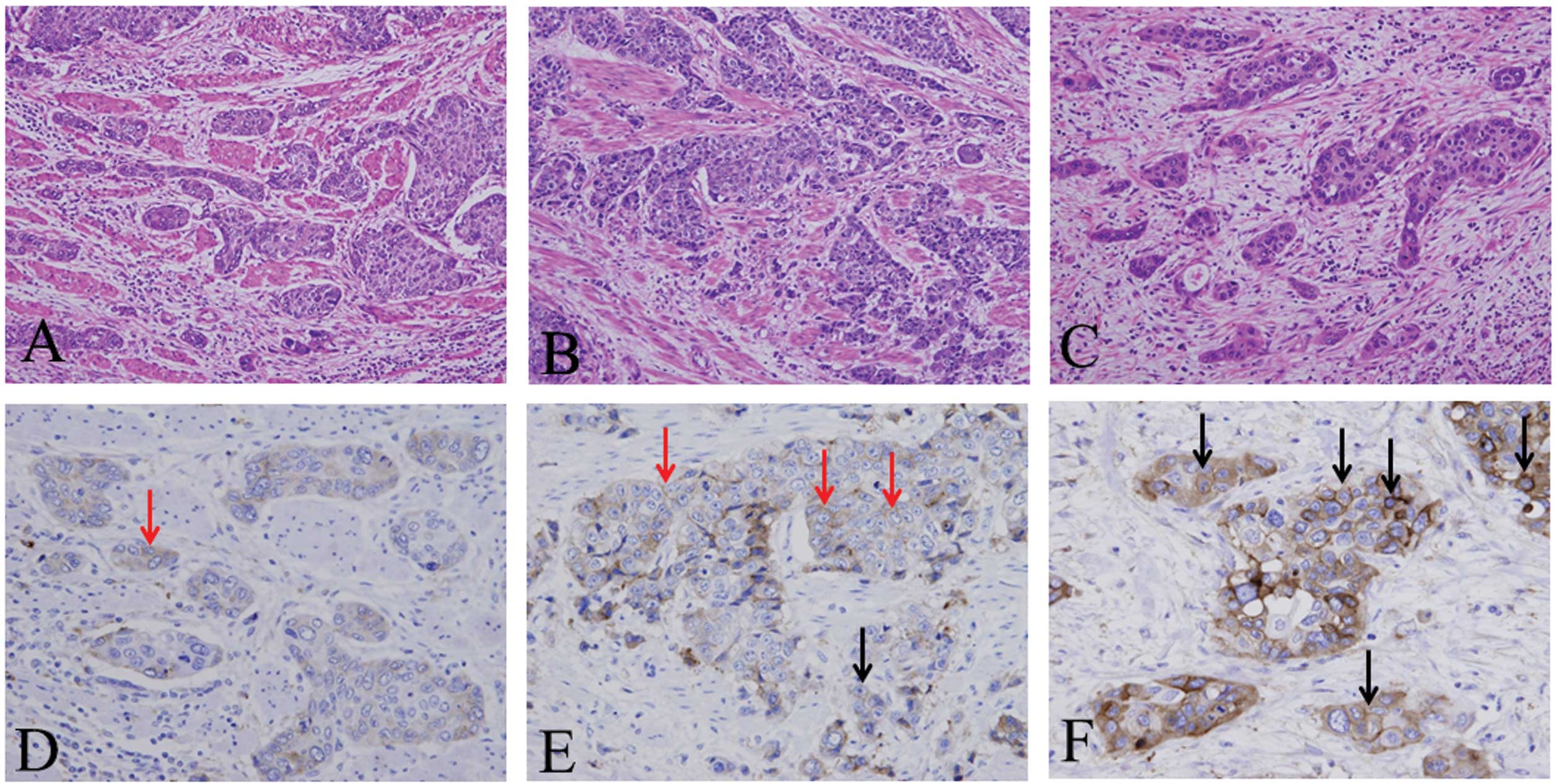|
1
|
Chino O, Kijima H, Shimada H, et al:
Accumulation of p53 in esophageal squamous cell carcinoma. Int J
Mol Med. 8:359–363. 2001.PubMed/NCBI
|
|
2
|
Oshiba G, Kijima H, Himeno S, et al:
Stromal thrombo-spondin-1 expression is correlated with progression
of esophageal squamous cell carcinomas. Anticancer Res.
19:4375–4378. 1999.
|
|
3
|
Makuuchi H, Shimada H, Mizutani K, et al:
Clinical pathological analysis of surgically resected superficial
esophageal carcinoma to determine criteria for deciding on
treatment strategy. Diagn Ther Endosc. 3:211–220. 1997. View Article : Google Scholar : PubMed/NCBI
|
|
4
|
Shimada H, Makuuchi H, Ozawa S, et al:
Technique of the double-channel ESD method performed with an EEMR
tube. Esophagus. 8:67–70. 2011. View Article : Google Scholar
|
|
5
|
Prognostic significance of CyclinD1 and
E-Cadherin in patients with esophageal squamous cell carcinoma:
multiinstitutional retrospective analysis. Research Committee on
Malignancy of Esophageal Cancer, Japanese Society for Esophageal
Diseases. J Am Coll Surg. 192:708–718. 2001. View Article : Google Scholar : PubMed/NCBI
|
|
6
|
Yoneda M, Fujiwara H, Furutani A, et al:
Prognostic impact of tumor IL-6 expression after preoperative
chemoradiotherapy in patients with advanced esophageal squamous
cell carcinoma. Anticancer Res. 33:2699–2705. 2013.PubMed/NCBI
|
|
7
|
Ito E, Ozawa S, Kijima H, et al: New
invasive patterns as a prognostic factor for superficial esophageal
cancer. J Gastroenterol. 47:1279–1289. 2012. View Article : Google Scholar : PubMed/NCBI
|
|
8
|
Kaneko MK, Kato Y, Kitano T and Osawa M:
Conservation of a platelet activating domain of Aggrus/podoplanin
as a platelet aggregation-inducing factor. Gene. 378:52–57. 2006.
View Article : Google Scholar : PubMed/NCBI
|
|
9
|
Martin-Villar E, Megías D, Castel S, et
al: Podoplanin binds ERM proteins to activate RhoA and promote
epithelial-mesenchymal transition. J Cell Sci. 119:4541–4553. 2006.
View Article : Google Scholar : PubMed/NCBI
|
|
10
|
Wicki A, Lehembre F, Wick N, et al: Tumor
invasion in the absence of epithelial-mesenchymal transition:
podoplanin-mediated remodeling of the actin cytoskeleton. Cancer
Cell. 9:261–272. 2006. View Article : Google Scholar : PubMed/NCBI
|
|
11
|
Rahadiani N, Ikeda J, Makino T, et al:
Tumorigenic role of podoplanin in esophageal squamous-cell
carcinoma. Ann Surg Oncol. 17:1311–1323. 2010. View Article : Google Scholar : PubMed/NCBI
|
|
12
|
Tong L, Yuan S, Feng F and Zhang H: Role
of podoplanin expression in esophageal squamous cell carcinoma: a
retrospective study. Dis Esophagus. 25:72–80. 2012. View Article : Google Scholar
|
|
13
|
Zeisberg M and Neilson EG: Biomarkers for
epithelial-mesenchymal transitions. J Clin Invest. 119:1429–1437.
2009. View
Article : Google Scholar : PubMed/NCBI
|
|
14
|
Thiery JP: Epithelial-mesenchymal
transitions in tumour progression. Nat Rev Cancer. 2:442–454. 2002.
View Article : Google Scholar : PubMed/NCBI
|
|
15
|
Satelli A and Li S: Vimentin in cancer and
its potential as a molecular target for cancer therapy. Cell Mol
Life Sci. 68:3033–3046. 2011. View Article : Google Scholar : PubMed/NCBI
|
|
16
|
Jin H, Morohashi S, Sato F, et al:
Vimentin expression of esophageal squamous cell carcinoma and its
aggressive potential for lymph node metastasis. Biomed Res.
31:105–112. 2010. View Article : Google Scholar : PubMed/NCBI
|
|
17
|
Mendez MG, Kojima S and Goldman RD:
Vimentin induces changes in cell shape, motility, and adhesion
during the epithelial to mesenchymal transition. FASEB J.
24:1838–1851. 2010. View Article : Google Scholar : PubMed/NCBI
|
|
18
|
Sobin LH, Gospodrowicz MK and Wittekind C:
TNM Classification of Malignant Tumors. 7th edition. Wiley;
Hoboken, NJ, USA: 2009
|
|
19
|
Japanese Gastric Cancer Association: Japan
classification of gastric carcinoma, 2nd English edition. Gastric
Cancer. 1:10–24. 1998. View Article : Google Scholar
|
|
20
|
Shimada Y, Ishii G, Nagai K, et al:
Expression of podoplanin, CD44, and p63 in squamous cell carcinoma
of the lung. Cancer Sci. 100:2054–2059. 2009. View Article : Google Scholar : PubMed/NCBI
|
|
21
|
Yuan P, Temam S, El-Naggar A, et al:
Overexpression of podoplanin in oral cancer and its association
with poor clinical outcome. Cancer. 107:563–569. 2006. View Article : Google Scholar : PubMed/NCBI
|
|
22
|
Suzuki H, Onimaru M, Yonemitsu Y, et al:
Podoplanin in cancer cells is experimentally able to attenuate
prolymphangiogenic and lymphogenous metastatic potentials of lung
squamoid cancer cells. Mol Cancer. 9:2872010. View Article : Google Scholar : PubMed/NCBI
|
|
23
|
Sudo T, Iwaya T, Nishida N, et al:
Expression of mesen-chymal markers vimentin and fibronectin: the
clinical significance in esophageal squamous cell carcinoma. Ann
Surg Oncol. 20(Suppl 3): S324–S335. 2013. View Article : Google Scholar
|
|
24
|
Wicki A and Christofori G: The potential
role of podoplanin in tumour invasion. Br J Cancer. 96:1–5. 2007.
View Article : Google Scholar
|
|
25
|
Myong NH: Loss of E-cadherin and
acquisition of vimentin in epithelial-mesenchymal transition are
noble indicators of uterine cervix cancer progression. Korean J
Pathol. 46:341–348. 2012. View Article : Google Scholar : PubMed/NCBI
|
|
26
|
Le Bras GF, Allison GL, Richards NF, et
al: CD44 upregulation in E-cadherin-negative esophageal cancers
results in cell invasion. PLoS One. 6:e270632011. View Article : Google Scholar : PubMed/NCBI
|
|
27
|
Usami Y, Satake S, Nakayama F, et al:
Snail-associated epithelial-mesenchymal transition promotes
oesophageal squamous cell carcinoma motility and progression. J
Pathol. 215:330–339. 2008. View Article : Google Scholar : PubMed/NCBI
|
|
28
|
Hendrix MJ, Seftor EA, Seftor RE and
Trevor KT: Experimental co-expression of vimentin and keratin
intermediate filaments in human breast cancer cells results in
phenotypic interconversion and increased invasive behavior. Am J
Pathol. 150:483–495. 1997.PubMed/NCBI
|
|
29
|
Dauphin M, Barbe C, Lemaire S, et al:
Vimentin expression predicts the occurrence of metastases in non
small cell lung carcinomas. Lung Cancer. 81:117–122. 2013.
View Article : Google Scholar : PubMed/NCBI
|


















